Developing Manager Report: Leadership, Skills, and Career Development
VerifiedAdded on 2020/06/05
|28
|7293
|278
Report
AI Summary
This report delves into the multifaceted aspects of developing management skills, exploring leadership styles, communication strategies, and organizational change within the context of the Virgin Group and Ryanair. It analyzes the management behaviors of both companies, comparing their leadership approaches and communication processes. The report also examines the importance of democratic leadership in the modern tourism industry and includes a personal skills audit, SWOT analysis, and SMART objectives to assess potential managerial capabilities. Furthermore, it addresses career development by providing recommendations for improving customer services and formulating a management development plan.
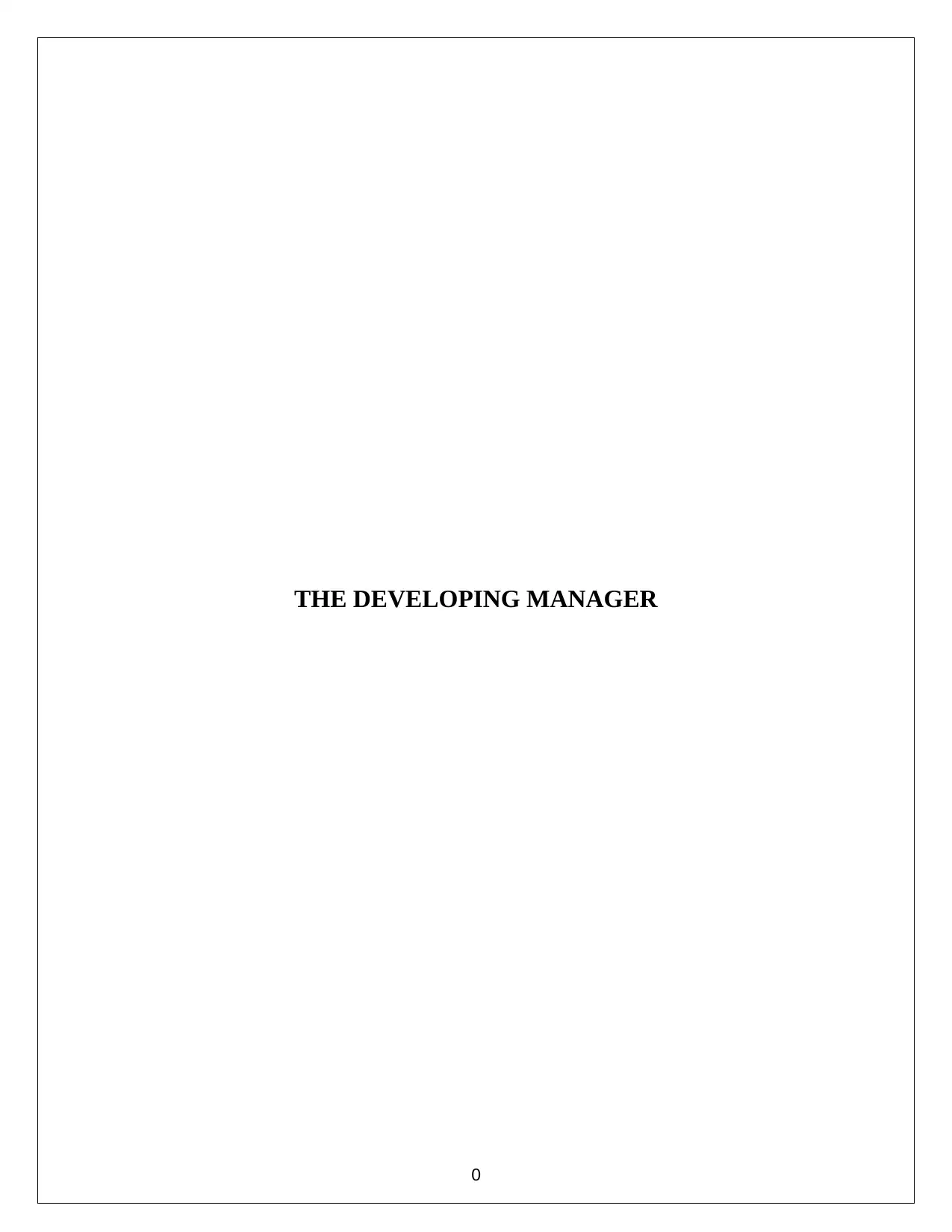
THE DEVELOPING MANAGER
0
0
Paraphrase This Document
Need a fresh take? Get an instant paraphrase of this document with our AI Paraphraser
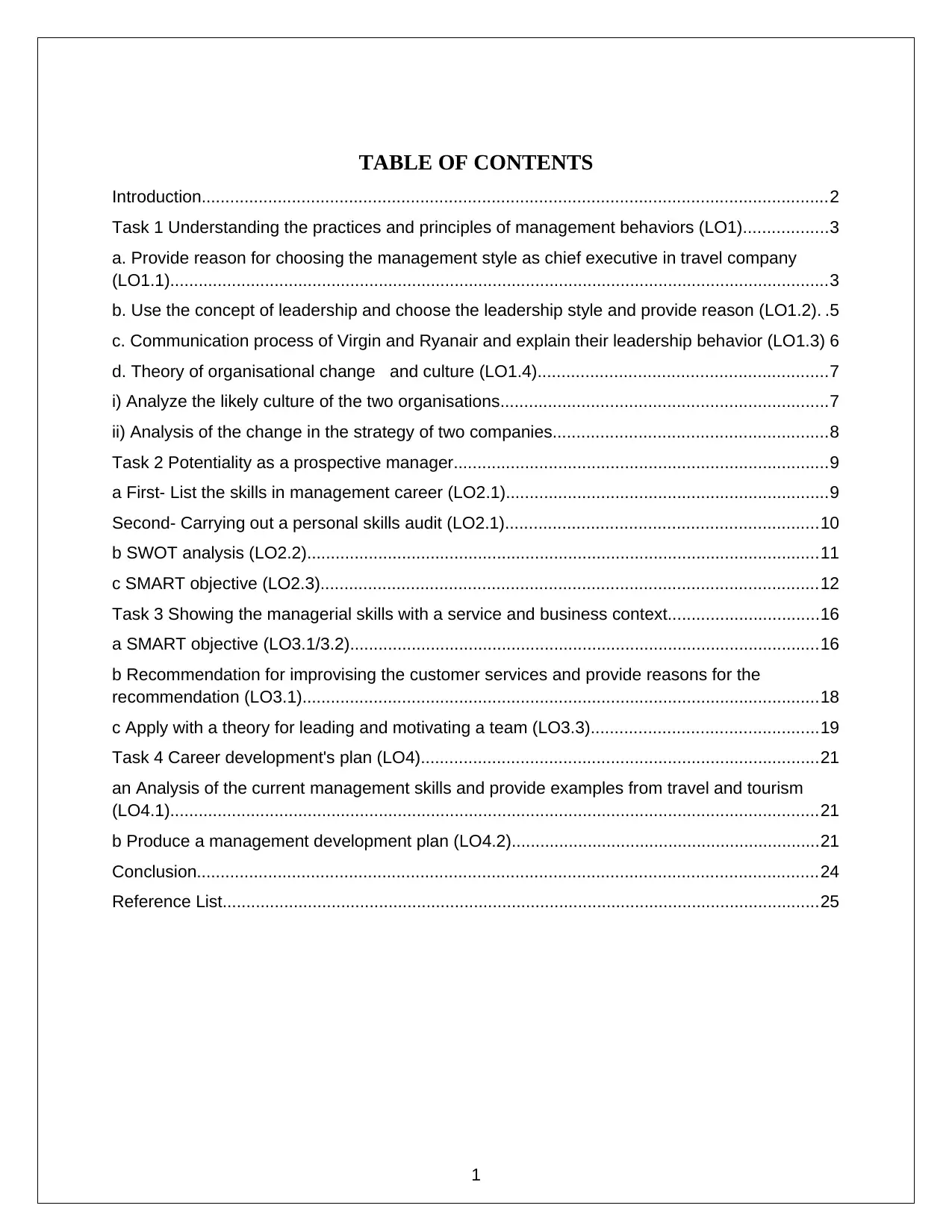
TABLE OF CONTENTS
Introduction....................................................................................................................................2
Task 1 Understanding the practices and principles of management behaviors (LO1)..................3
a. Provide reason for choosing the management style as chief executive in travel company
(LO1.1)...........................................................................................................................................3
b. Use the concept of leadership and choose the leadership style and provide reason (LO1.2). .5
c. Communication process of Virgin and Ryanair and explain their leadership behavior (LO1.3) 6
d. Theory of organisational change and culture (LO1.4).............................................................7
i) Analyze the likely culture of the two organisations.....................................................................7
ii) Analysis of the change in the strategy of two companies..........................................................8
Task 2 Potentiality as a prospective manager...............................................................................9
a First- List the skills in management career (LO2.1)....................................................................9
Second- Carrying out a personal skills audit (LO2.1)..................................................................10
b SWOT analysis (LO2.2)............................................................................................................11
c SMART objective (LO2.3).........................................................................................................12
Task 3 Showing the managerial skills with a service and business context................................16
a SMART objective (LO3.1/3.2)...................................................................................................16
b Recommendation for improvising the customer services and provide reasons for the
recommendation (LO3.1).............................................................................................................18
c Apply with a theory for leading and motivating a team (LO3.3)................................................19
Task 4 Career development's plan (LO4)....................................................................................21
an Analysis of the current management skills and provide examples from travel and tourism
(LO4.1).........................................................................................................................................21
b Produce a management development plan (LO4.2).................................................................21
Conclusion...................................................................................................................................24
Reference List..............................................................................................................................25
1
Introduction....................................................................................................................................2
Task 1 Understanding the practices and principles of management behaviors (LO1)..................3
a. Provide reason for choosing the management style as chief executive in travel company
(LO1.1)...........................................................................................................................................3
b. Use the concept of leadership and choose the leadership style and provide reason (LO1.2). .5
c. Communication process of Virgin and Ryanair and explain their leadership behavior (LO1.3) 6
d. Theory of organisational change and culture (LO1.4).............................................................7
i) Analyze the likely culture of the two organisations.....................................................................7
ii) Analysis of the change in the strategy of two companies..........................................................8
Task 2 Potentiality as a prospective manager...............................................................................9
a First- List the skills in management career (LO2.1)....................................................................9
Second- Carrying out a personal skills audit (LO2.1)..................................................................10
b SWOT analysis (LO2.2)............................................................................................................11
c SMART objective (LO2.3).........................................................................................................12
Task 3 Showing the managerial skills with a service and business context................................16
a SMART objective (LO3.1/3.2)...................................................................................................16
b Recommendation for improvising the customer services and provide reasons for the
recommendation (LO3.1).............................................................................................................18
c Apply with a theory for leading and motivating a team (LO3.3)................................................19
Task 4 Career development's plan (LO4)....................................................................................21
an Analysis of the current management skills and provide examples from travel and tourism
(LO4.1).........................................................................................................................................21
b Produce a management development plan (LO4.2).................................................................21
Conclusion...................................................................................................................................24
Reference List..............................................................................................................................25
1
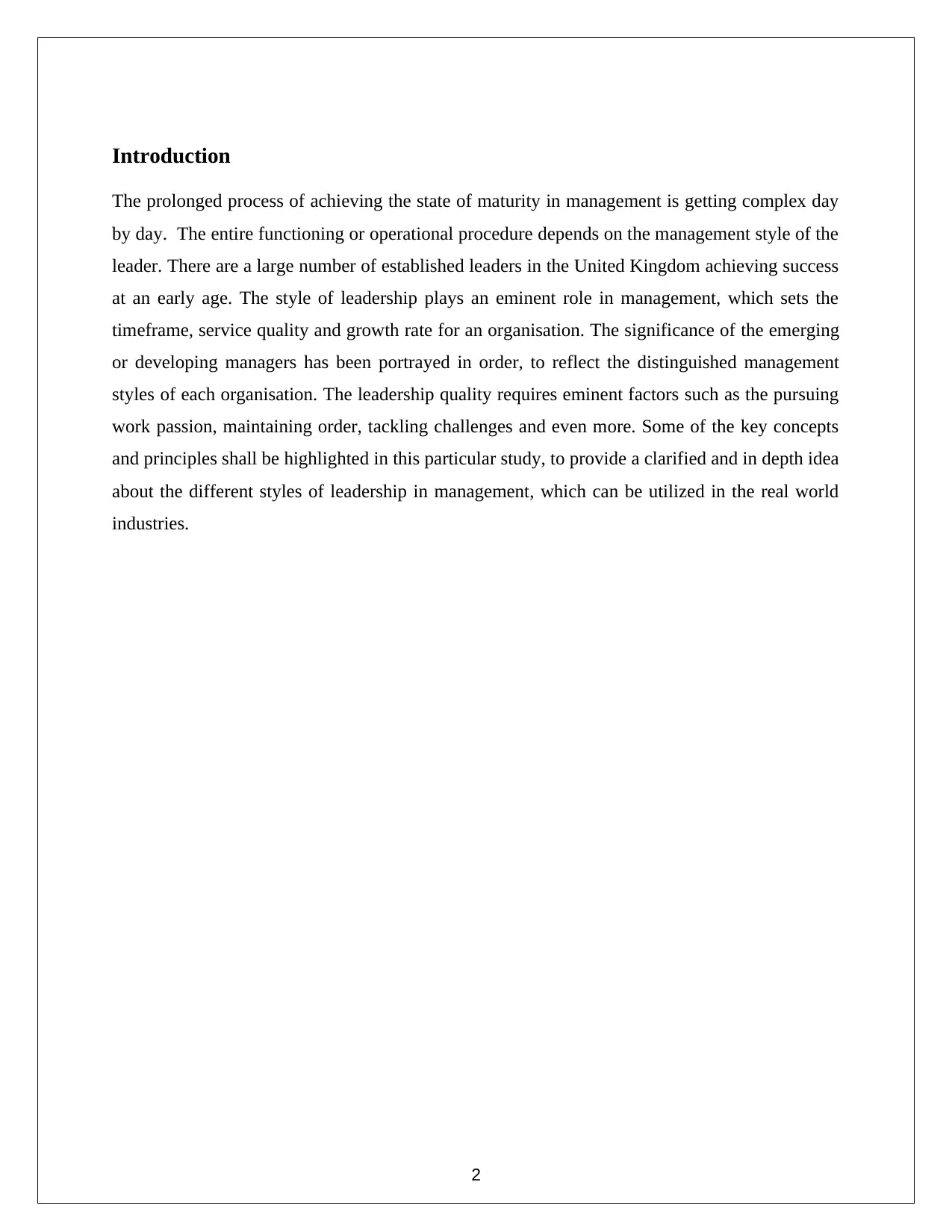
Introduction
The prolonged process of achieving the state of maturity in management is getting complex day
by day. The entire functioning or operational procedure depends on the management style of the
leader. There are a large number of established leaders in the United Kingdom achieving success
at an early age. The style of leadership plays an eminent role in management, which sets the
timeframe, service quality and growth rate for an organisation. The significance of the emerging
or developing managers has been portrayed in order, to reflect the distinguished management
styles of each organisation. The leadership quality requires eminent factors such as the pursuing
work passion, maintaining order, tackling challenges and even more. Some of the key concepts
and principles shall be highlighted in this particular study, to provide a clarified and in depth idea
about the different styles of leadership in management, which can be utilized in the real world
industries.
2
The prolonged process of achieving the state of maturity in management is getting complex day
by day. The entire functioning or operational procedure depends on the management style of the
leader. There are a large number of established leaders in the United Kingdom achieving success
at an early age. The style of leadership plays an eminent role in management, which sets the
timeframe, service quality and growth rate for an organisation. The significance of the emerging
or developing managers has been portrayed in order, to reflect the distinguished management
styles of each organisation. The leadership quality requires eminent factors such as the pursuing
work passion, maintaining order, tackling challenges and even more. Some of the key concepts
and principles shall be highlighted in this particular study, to provide a clarified and in depth idea
about the different styles of leadership in management, which can be utilized in the real world
industries.
2
⊘ This is a preview!⊘
Do you want full access?
Subscribe today to unlock all pages.

Trusted by 1+ million students worldwide
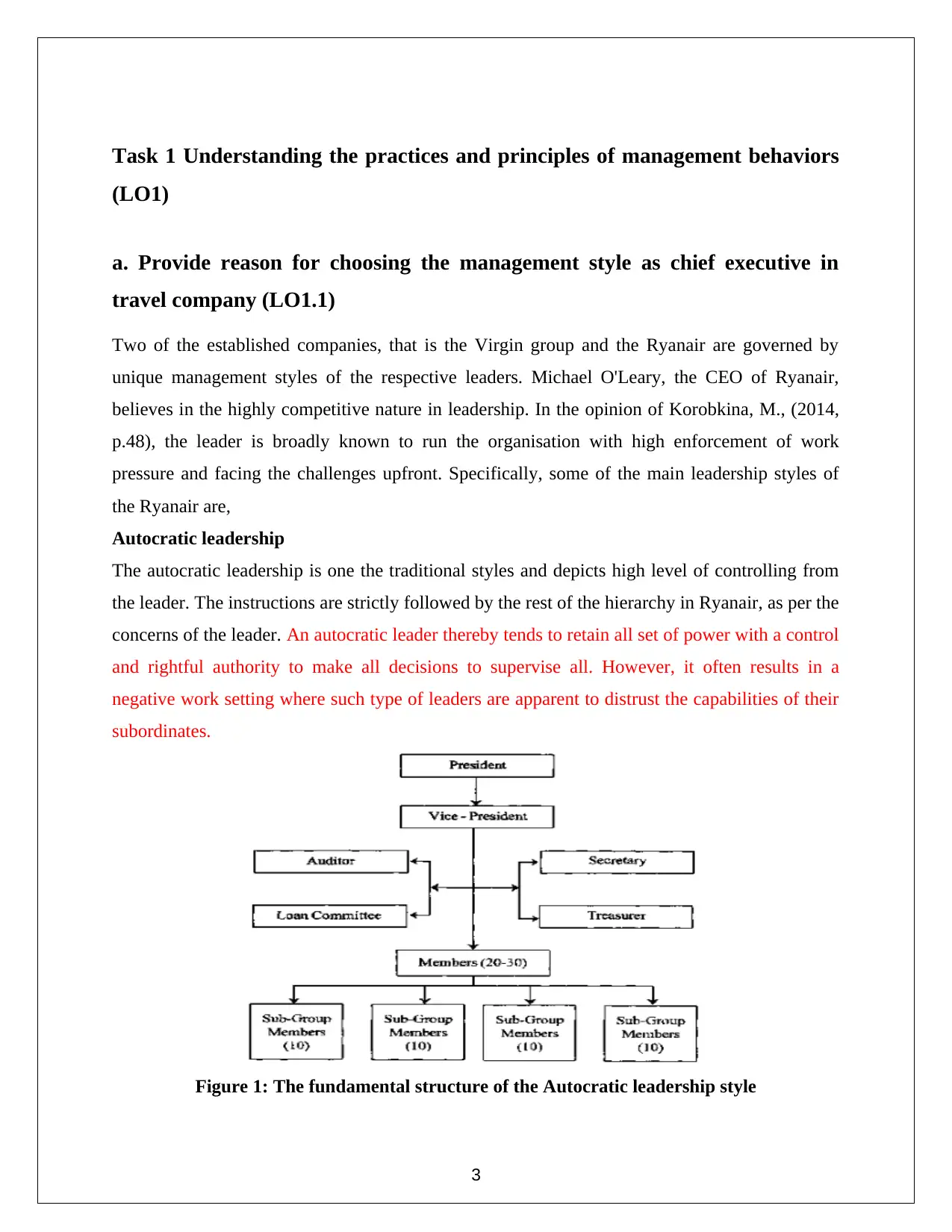
Task 1 Understanding the practices and principles of management behaviors
(LO1)
a. Provide reason for choosing the management style as chief executive in
travel company (LO1.1)
Two of the established companies, that is the Virgin group and the Ryanair are governed by
unique management styles of the respective leaders. Michael O'Leary, the CEO of Ryanair,
believes in the highly competitive nature in leadership. In the opinion of Korobkina, M., (2014,
p.48), the leader is broadly known to run the organisation with high enforcement of work
pressure and facing the challenges upfront. Specifically, some of the main leadership styles of
the Ryanair are,
Autocratic leadership
The autocratic leadership is one the traditional styles and depicts high level of controlling from
the leader. The instructions are strictly followed by the rest of the hierarchy in Ryanair, as per the
concerns of the leader. An autocratic leader thereby tends to retain all set of power with a control
and rightful authority to make all decisions to supervise all. However, it often results in a
negative work setting where such type of leaders are apparent to distrust the capabilities of their
subordinates.
Figure 1: The fundamental structure of the Autocratic leadership style
3
(LO1)
a. Provide reason for choosing the management style as chief executive in
travel company (LO1.1)
Two of the established companies, that is the Virgin group and the Ryanair are governed by
unique management styles of the respective leaders. Michael O'Leary, the CEO of Ryanair,
believes in the highly competitive nature in leadership. In the opinion of Korobkina, M., (2014,
p.48), the leader is broadly known to run the organisation with high enforcement of work
pressure and facing the challenges upfront. Specifically, some of the main leadership styles of
the Ryanair are,
Autocratic leadership
The autocratic leadership is one the traditional styles and depicts high level of controlling from
the leader. The instructions are strictly followed by the rest of the hierarchy in Ryanair, as per the
concerns of the leader. An autocratic leader thereby tends to retain all set of power with a control
and rightful authority to make all decisions to supervise all. However, it often results in a
negative work setting where such type of leaders are apparent to distrust the capabilities of their
subordinates.
Figure 1: The fundamental structure of the Autocratic leadership style
3
Paraphrase This Document
Need a fresh take? Get an instant paraphrase of this document with our AI Paraphraser
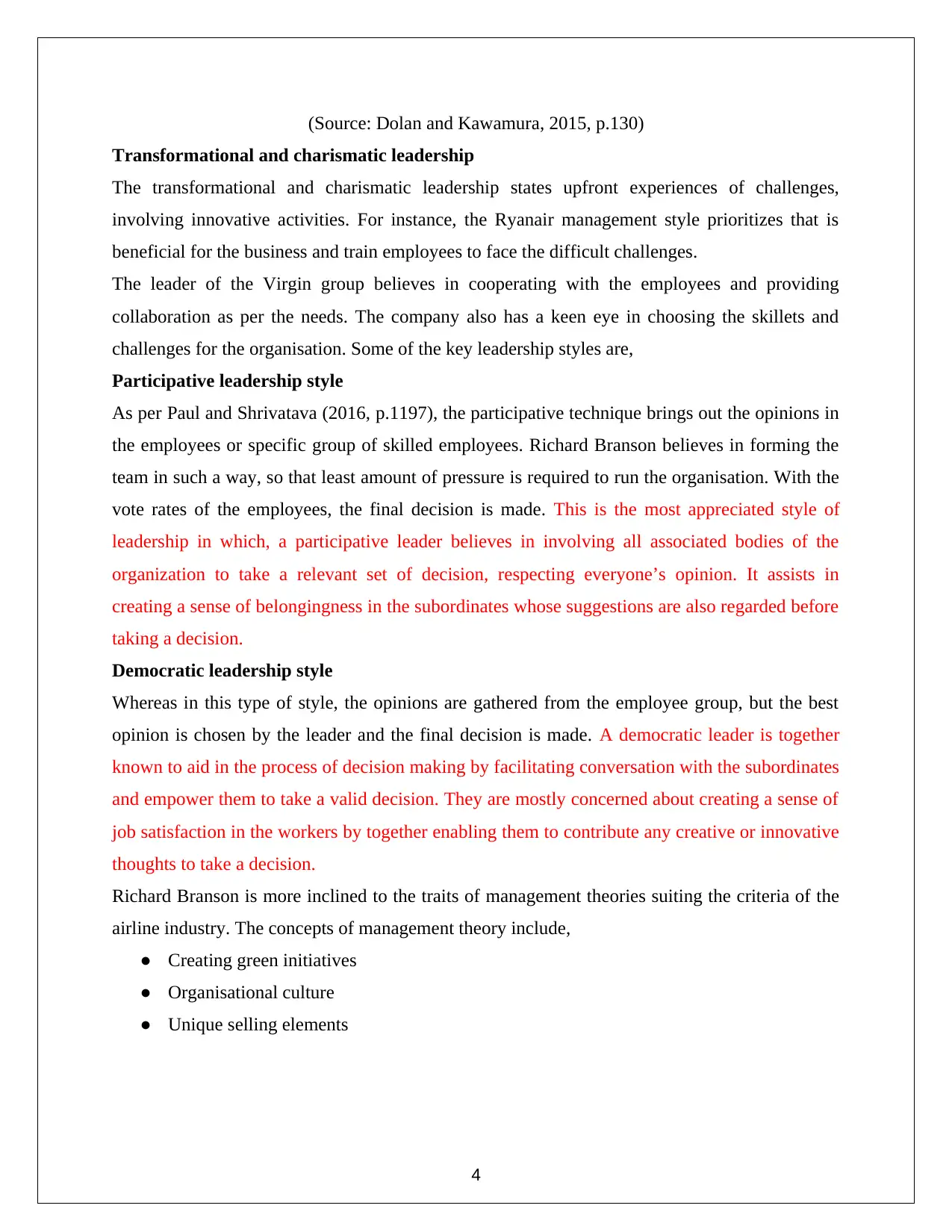
(Source: Dolan and Kawamura, 2015, p.130)
Transformational and charismatic leadership
The transformational and charismatic leadership states upfront experiences of challenges,
involving innovative activities. For instance, the Ryanair management style prioritizes that is
beneficial for the business and train employees to face the difficult challenges.
The leader of the Virgin group believes in cooperating with the employees and providing
collaboration as per the needs. The company also has a keen eye in choosing the skillets and
challenges for the organisation. Some of the key leadership styles are,
Participative leadership style
As per Paul and Shrivatava (2016, p.1197), the participative technique brings out the opinions in
the employees or specific group of skilled employees. Richard Branson believes in forming the
team in such a way, so that least amount of pressure is required to run the organisation. With the
vote rates of the employees, the final decision is made. This is the most appreciated style of
leadership in which, a participative leader believes in involving all associated bodies of the
organization to take a relevant set of decision, respecting everyone’s opinion. It assists in
creating a sense of belongingness in the subordinates whose suggestions are also regarded before
taking a decision.
Democratic leadership style
Whereas in this type of style, the opinions are gathered from the employee group, but the best
opinion is chosen by the leader and the final decision is made. A democratic leader is together
known to aid in the process of decision making by facilitating conversation with the subordinates
and empower them to take a valid decision. They are mostly concerned about creating a sense of
job satisfaction in the workers by together enabling them to contribute any creative or innovative
thoughts to take a decision.
Richard Branson is more inclined to the traits of management theories suiting the criteria of the
airline industry. The concepts of management theory include,
● Creating green initiatives
● Organisational culture
● Unique selling elements
4
Transformational and charismatic leadership
The transformational and charismatic leadership states upfront experiences of challenges,
involving innovative activities. For instance, the Ryanair management style prioritizes that is
beneficial for the business and train employees to face the difficult challenges.
The leader of the Virgin group believes in cooperating with the employees and providing
collaboration as per the needs. The company also has a keen eye in choosing the skillets and
challenges for the organisation. Some of the key leadership styles are,
Participative leadership style
As per Paul and Shrivatava (2016, p.1197), the participative technique brings out the opinions in
the employees or specific group of skilled employees. Richard Branson believes in forming the
team in such a way, so that least amount of pressure is required to run the organisation. With the
vote rates of the employees, the final decision is made. This is the most appreciated style of
leadership in which, a participative leader believes in involving all associated bodies of the
organization to take a relevant set of decision, respecting everyone’s opinion. It assists in
creating a sense of belongingness in the subordinates whose suggestions are also regarded before
taking a decision.
Democratic leadership style
Whereas in this type of style, the opinions are gathered from the employee group, but the best
opinion is chosen by the leader and the final decision is made. A democratic leader is together
known to aid in the process of decision making by facilitating conversation with the subordinates
and empower them to take a valid decision. They are mostly concerned about creating a sense of
job satisfaction in the workers by together enabling them to contribute any creative or innovative
thoughts to take a decision.
Richard Branson is more inclined to the traits of management theories suiting the criteria of the
airline industry. The concepts of management theory include,
● Creating green initiatives
● Organisational culture
● Unique selling elements
4
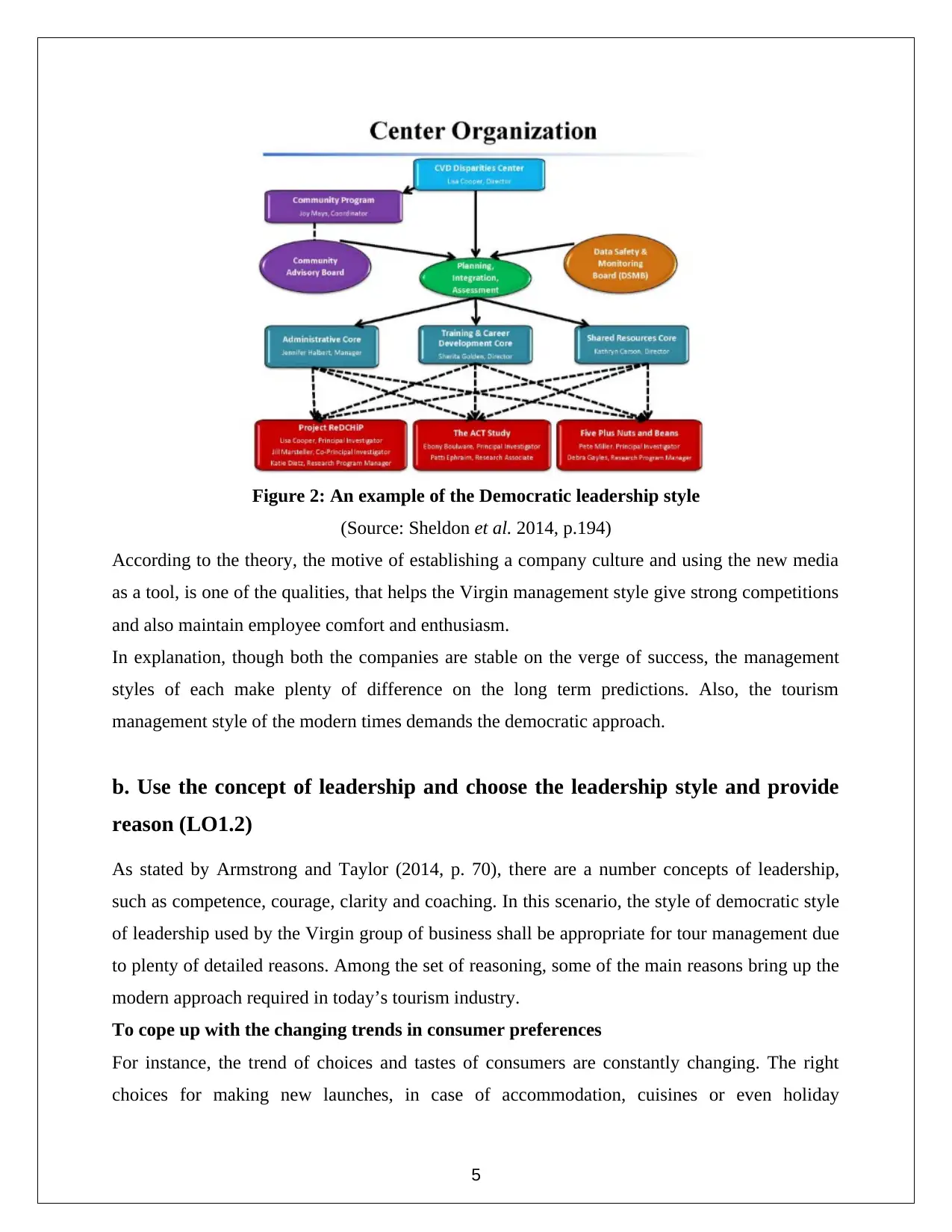
Figure 2: An example of the Democratic leadership style
(Source: Sheldon et al. 2014, p.194)
According to the theory, the motive of establishing a company culture and using the new media
as a tool, is one of the qualities, that helps the Virgin management style give strong competitions
and also maintain employee comfort and enthusiasm.
In explanation, though both the companies are stable on the verge of success, the management
styles of each make plenty of difference on the long term predictions. Also, the tourism
management style of the modern times demands the democratic approach.
b. Use the concept of leadership and choose the leadership style and provide
reason (LO1.2)
As stated by Armstrong and Taylor (2014, p. 70), there are a number concepts of leadership,
such as competence, courage, clarity and coaching. In this scenario, the style of democratic style
of leadership used by the Virgin group of business shall be appropriate for tour management due
to plenty of detailed reasons. Among the set of reasoning, some of the main reasons bring up the
modern approach required in today’s tourism industry.
To cope up with the changing trends in consumer preferences
For instance, the trend of choices and tastes of consumers are constantly changing. The right
choices for making new launches, in case of accommodation, cuisines or even holiday
5
(Source: Sheldon et al. 2014, p.194)
According to the theory, the motive of establishing a company culture and using the new media
as a tool, is one of the qualities, that helps the Virgin management style give strong competitions
and also maintain employee comfort and enthusiasm.
In explanation, though both the companies are stable on the verge of success, the management
styles of each make plenty of difference on the long term predictions. Also, the tourism
management style of the modern times demands the democratic approach.
b. Use the concept of leadership and choose the leadership style and provide
reason (LO1.2)
As stated by Armstrong and Taylor (2014, p. 70), there are a number concepts of leadership,
such as competence, courage, clarity and coaching. In this scenario, the style of democratic style
of leadership used by the Virgin group of business shall be appropriate for tour management due
to plenty of detailed reasons. Among the set of reasoning, some of the main reasons bring up the
modern approach required in today’s tourism industry.
To cope up with the changing trends in consumer preferences
For instance, the trend of choices and tastes of consumers are constantly changing. The right
choices for making new launches, in case of accommodation, cuisines or even holiday
5
⊘ This is a preview!⊘
Do you want full access?
Subscribe today to unlock all pages.

Trusted by 1+ million students worldwide
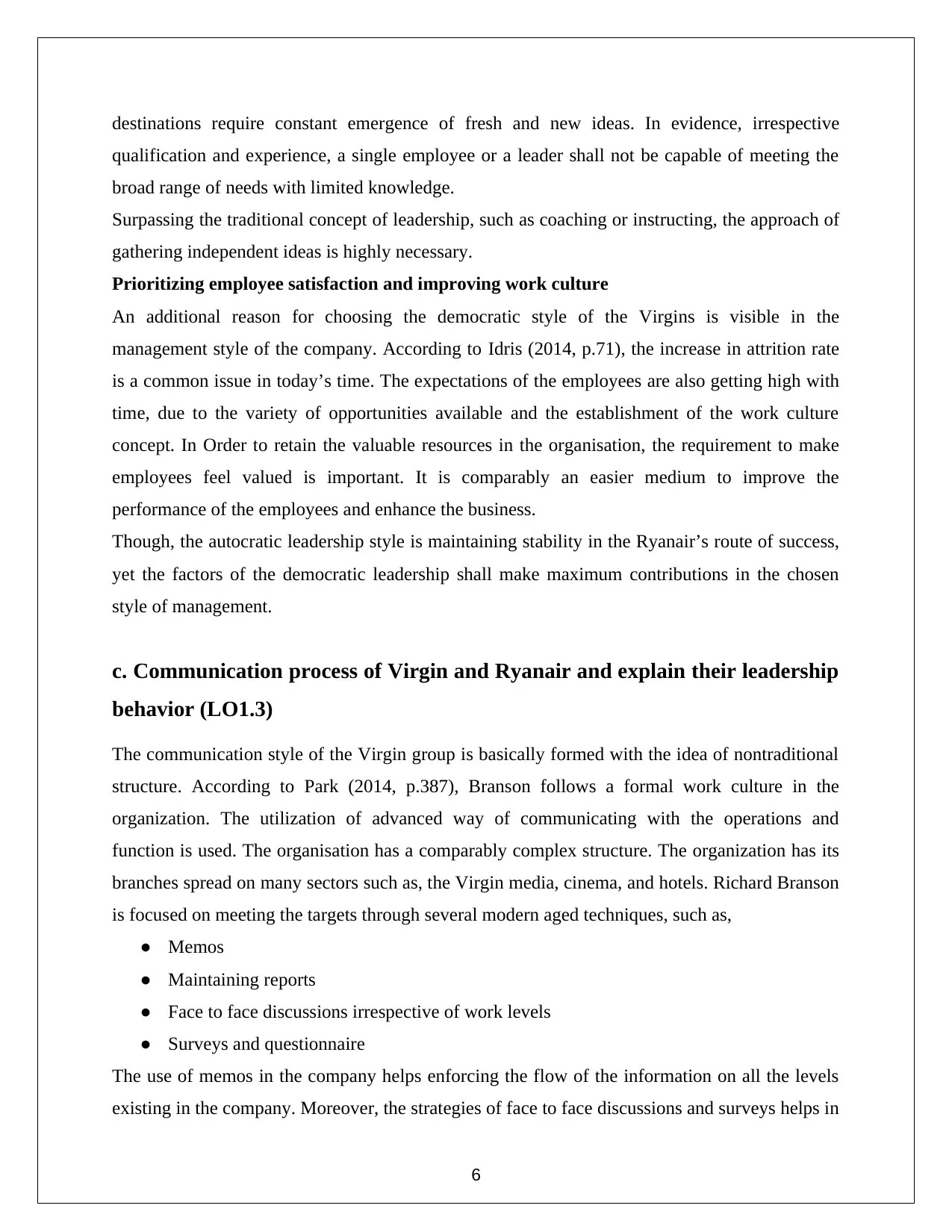
destinations require constant emergence of fresh and new ideas. In evidence, irrespective
qualification and experience, a single employee or a leader shall not be capable of meeting the
broad range of needs with limited knowledge.
Surpassing the traditional concept of leadership, such as coaching or instructing, the approach of
gathering independent ideas is highly necessary.
Prioritizing employee satisfaction and improving work culture
An additional reason for choosing the democratic style of the Virgins is visible in the
management style of the company. According to Idris (2014, p.71), the increase in attrition rate
is a common issue in today’s time. The expectations of the employees are also getting high with
time, due to the variety of opportunities available and the establishment of the work culture
concept. In Order to retain the valuable resources in the organisation, the requirement to make
employees feel valued is important. It is comparably an easier medium to improve the
performance of the employees and enhance the business.
Though, the autocratic leadership style is maintaining stability in the Ryanair’s route of success,
yet the factors of the democratic leadership shall make maximum contributions in the chosen
style of management.
c. Communication process of Virgin and Ryanair and explain their leadership
behavior (LO1.3)
The communication style of the Virgin group is basically formed with the idea of nontraditional
structure. According to Park (2014, p.387), Branson follows a formal work culture in the
organization. The utilization of advanced way of communicating with the operations and
function is used. The organisation has a comparably complex structure. The organization has its
branches spread on many sectors such as, the Virgin media, cinema, and hotels. Richard Branson
is focused on meeting the targets through several modern aged techniques, such as,
● Memos
● Maintaining reports
● Face to face discussions irrespective of work levels
● Surveys and questionnaire
The use of memos in the company helps enforcing the flow of the information on all the levels
existing in the company. Moreover, the strategies of face to face discussions and surveys helps in
6
qualification and experience, a single employee or a leader shall not be capable of meeting the
broad range of needs with limited knowledge.
Surpassing the traditional concept of leadership, such as coaching or instructing, the approach of
gathering independent ideas is highly necessary.
Prioritizing employee satisfaction and improving work culture
An additional reason for choosing the democratic style of the Virgins is visible in the
management style of the company. According to Idris (2014, p.71), the increase in attrition rate
is a common issue in today’s time. The expectations of the employees are also getting high with
time, due to the variety of opportunities available and the establishment of the work culture
concept. In Order to retain the valuable resources in the organisation, the requirement to make
employees feel valued is important. It is comparably an easier medium to improve the
performance of the employees and enhance the business.
Though, the autocratic leadership style is maintaining stability in the Ryanair’s route of success,
yet the factors of the democratic leadership shall make maximum contributions in the chosen
style of management.
c. Communication process of Virgin and Ryanair and explain their leadership
behavior (LO1.3)
The communication style of the Virgin group is basically formed with the idea of nontraditional
structure. According to Park (2014, p.387), Branson follows a formal work culture in the
organization. The utilization of advanced way of communicating with the operations and
function is used. The organisation has a comparably complex structure. The organization has its
branches spread on many sectors such as, the Virgin media, cinema, and hotels. Richard Branson
is focused on meeting the targets through several modern aged techniques, such as,
● Memos
● Maintaining reports
● Face to face discussions irrespective of work levels
● Surveys and questionnaire
The use of memos in the company helps enforcing the flow of the information on all the levels
existing in the company. Moreover, the strategies of face to face discussions and surveys helps in
6
Paraphrase This Document
Need a fresh take? Get an instant paraphrase of this document with our AI Paraphraser
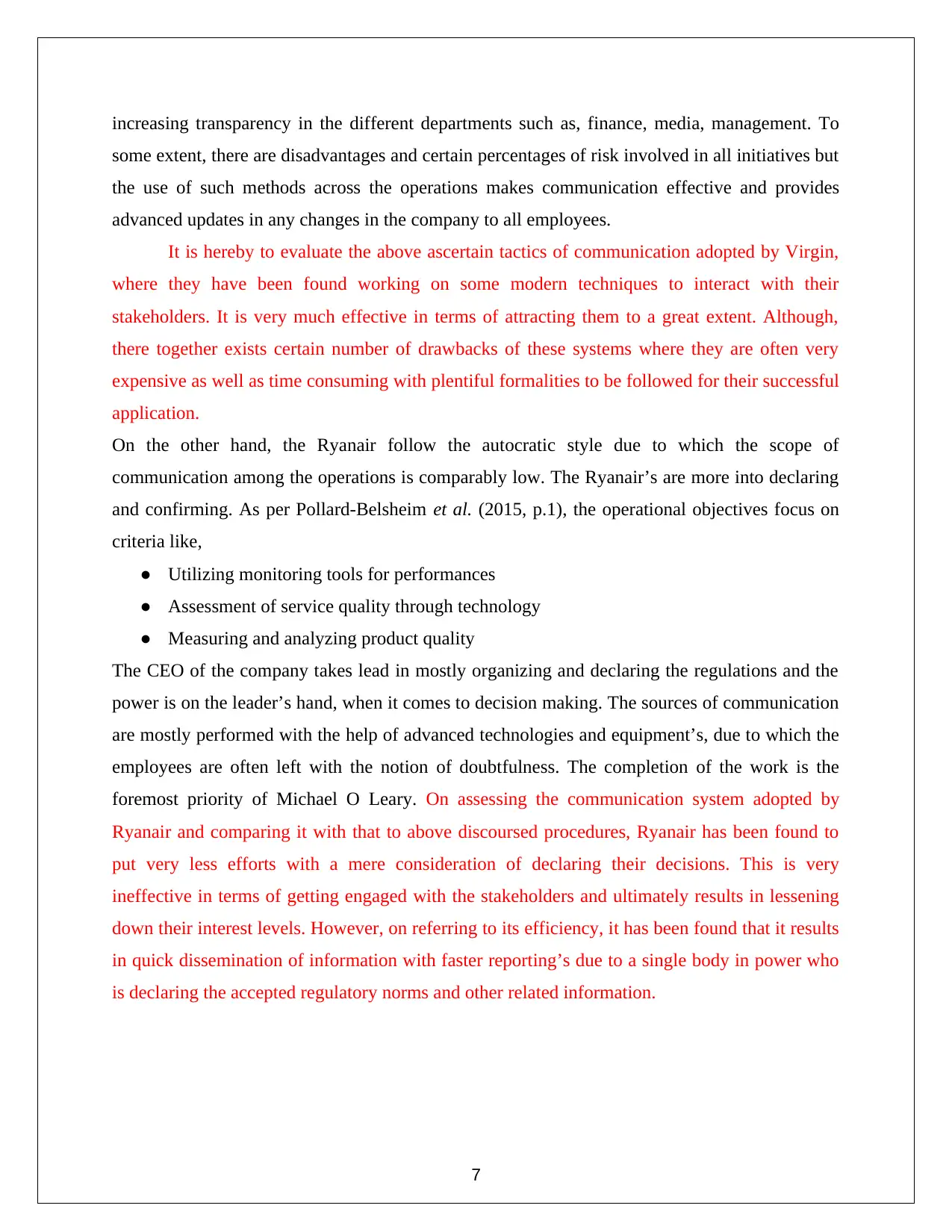
increasing transparency in the different departments such as, finance, media, management. To
some extent, there are disadvantages and certain percentages of risk involved in all initiatives but
the use of such methods across the operations makes communication effective and provides
advanced updates in any changes in the company to all employees.
It is hereby to evaluate the above ascertain tactics of communication adopted by Virgin,
where they have been found working on some modern techniques to interact with their
stakeholders. It is very much effective in terms of attracting them to a great extent. Although,
there together exists certain number of drawbacks of these systems where they are often very
expensive as well as time consuming with plentiful formalities to be followed for their successful
application.
On the other hand, the Ryanair follow the autocratic style due to which the scope of
communication among the operations is comparably low. The Ryanair’s are more into declaring
and confirming. As per Pollard-Belsheim et al. (2015, p.1), the operational objectives focus on
criteria like,
● Utilizing monitoring tools for performances
● Assessment of service quality through technology
● Measuring and analyzing product quality
The CEO of the company takes lead in mostly organizing and declaring the regulations and the
power is on the leader’s hand, when it comes to decision making. The sources of communication
are mostly performed with the help of advanced technologies and equipment’s, due to which the
employees are often left with the notion of doubtfulness. The completion of the work is the
foremost priority of Michael O Leary. On assessing the communication system adopted by
Ryanair and comparing it with that to above discoursed procedures, Ryanair has been found to
put very less efforts with a mere consideration of declaring their decisions. This is very
ineffective in terms of getting engaged with the stakeholders and ultimately results in lessening
down their interest levels. However, on referring to its efficiency, it has been found that it results
in quick dissemination of information with faster reporting’s due to a single body in power who
is declaring the accepted regulatory norms and other related information.
7
some extent, there are disadvantages and certain percentages of risk involved in all initiatives but
the use of such methods across the operations makes communication effective and provides
advanced updates in any changes in the company to all employees.
It is hereby to evaluate the above ascertain tactics of communication adopted by Virgin,
where they have been found working on some modern techniques to interact with their
stakeholders. It is very much effective in terms of attracting them to a great extent. Although,
there together exists certain number of drawbacks of these systems where they are often very
expensive as well as time consuming with plentiful formalities to be followed for their successful
application.
On the other hand, the Ryanair follow the autocratic style due to which the scope of
communication among the operations is comparably low. The Ryanair’s are more into declaring
and confirming. As per Pollard-Belsheim et al. (2015, p.1), the operational objectives focus on
criteria like,
● Utilizing monitoring tools for performances
● Assessment of service quality through technology
● Measuring and analyzing product quality
The CEO of the company takes lead in mostly organizing and declaring the regulations and the
power is on the leader’s hand, when it comes to decision making. The sources of communication
are mostly performed with the help of advanced technologies and equipment’s, due to which the
employees are often left with the notion of doubtfulness. The completion of the work is the
foremost priority of Michael O Leary. On assessing the communication system adopted by
Ryanair and comparing it with that to above discoursed procedures, Ryanair has been found to
put very less efforts with a mere consideration of declaring their decisions. This is very
ineffective in terms of getting engaged with the stakeholders and ultimately results in lessening
down their interest levels. However, on referring to its efficiency, it has been found that it results
in quick dissemination of information with faster reporting’s due to a single body in power who
is declaring the accepted regulatory norms and other related information.
7
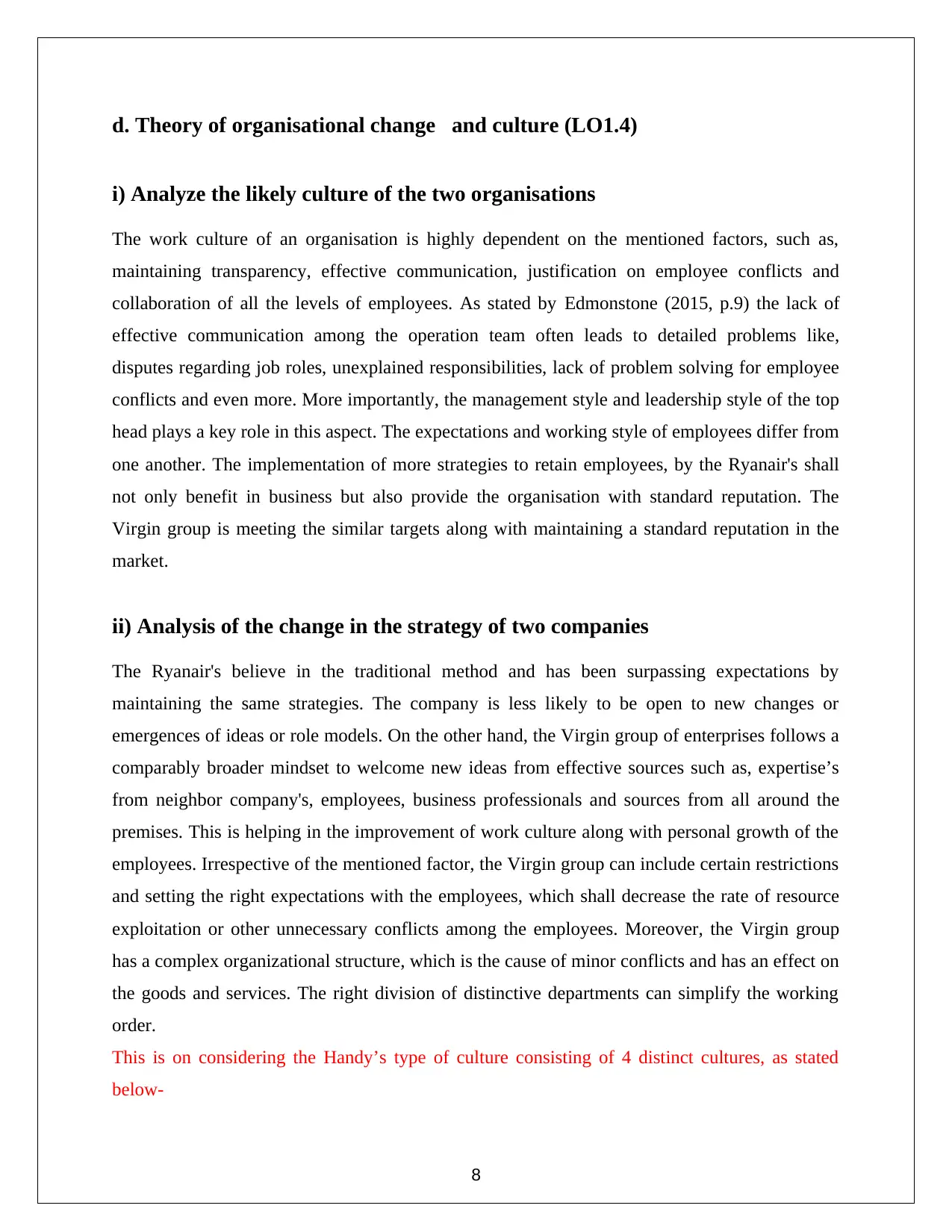
d. Theory of organisational change and culture (LO1.4)
i) Analyze the likely culture of the two organisations
The work culture of an organisation is highly dependent on the mentioned factors, such as,
maintaining transparency, effective communication, justification on employee conflicts and
collaboration of all the levels of employees. As stated by Edmonstone (2015, p.9) the lack of
effective communication among the operation team often leads to detailed problems like,
disputes regarding job roles, unexplained responsibilities, lack of problem solving for employee
conflicts and even more. More importantly, the management style and leadership style of the top
head plays a key role in this aspect. The expectations and working style of employees differ from
one another. The implementation of more strategies to retain employees, by the Ryanair's shall
not only benefit in business but also provide the organisation with standard reputation. The
Virgin group is meeting the similar targets along with maintaining a standard reputation in the
market.
ii) Analysis of the change in the strategy of two companies
The Ryanair's believe in the traditional method and has been surpassing expectations by
maintaining the same strategies. The company is less likely to be open to new changes or
emergences of ideas or role models. On the other hand, the Virgin group of enterprises follows a
comparably broader mindset to welcome new ideas from effective sources such as, expertise’s
from neighbor company's, employees, business professionals and sources from all around the
premises. This is helping in the improvement of work culture along with personal growth of the
employees. Irrespective of the mentioned factor, the Virgin group can include certain restrictions
and setting the right expectations with the employees, which shall decrease the rate of resource
exploitation or other unnecessary conflicts among the employees. Moreover, the Virgin group
has a complex organizational structure, which is the cause of minor conflicts and has an effect on
the goods and services. The right division of distinctive departments can simplify the working
order.
This is on considering the Handy’s type of culture consisting of 4 distinct cultures, as stated
below-
8
i) Analyze the likely culture of the two organisations
The work culture of an organisation is highly dependent on the mentioned factors, such as,
maintaining transparency, effective communication, justification on employee conflicts and
collaboration of all the levels of employees. As stated by Edmonstone (2015, p.9) the lack of
effective communication among the operation team often leads to detailed problems like,
disputes regarding job roles, unexplained responsibilities, lack of problem solving for employee
conflicts and even more. More importantly, the management style and leadership style of the top
head plays a key role in this aspect. The expectations and working style of employees differ from
one another. The implementation of more strategies to retain employees, by the Ryanair's shall
not only benefit in business but also provide the organisation with standard reputation. The
Virgin group is meeting the similar targets along with maintaining a standard reputation in the
market.
ii) Analysis of the change in the strategy of two companies
The Ryanair's believe in the traditional method and has been surpassing expectations by
maintaining the same strategies. The company is less likely to be open to new changes or
emergences of ideas or role models. On the other hand, the Virgin group of enterprises follows a
comparably broader mindset to welcome new ideas from effective sources such as, expertise’s
from neighbor company's, employees, business professionals and sources from all around the
premises. This is helping in the improvement of work culture along with personal growth of the
employees. Irrespective of the mentioned factor, the Virgin group can include certain restrictions
and setting the right expectations with the employees, which shall decrease the rate of resource
exploitation or other unnecessary conflicts among the employees. Moreover, the Virgin group
has a complex organizational structure, which is the cause of minor conflicts and has an effect on
the goods and services. The right division of distinctive departments can simplify the working
order.
This is on considering the Handy’s type of culture consisting of 4 distinct cultures, as stated
below-
8
⊘ This is a preview!⊘
Do you want full access?
Subscribe today to unlock all pages.

Trusted by 1+ million students worldwide
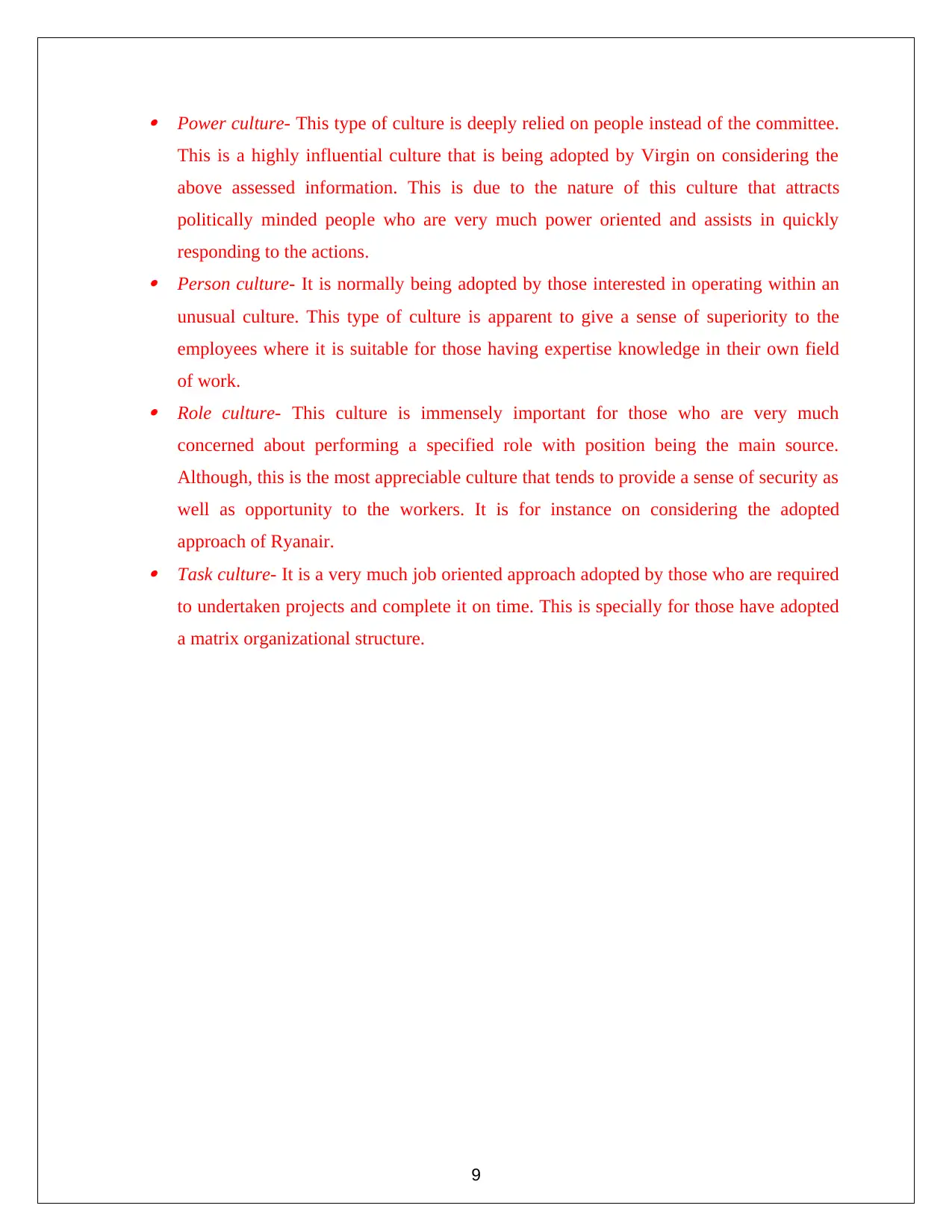
Power culture- This type of culture is deeply relied on people instead of the committee.
This is a highly influential culture that is being adopted by Virgin on considering the
above assessed information. This is due to the nature of this culture that attracts
politically minded people who are very much power oriented and assists in quickly
responding to the actions. Person culture- It is normally being adopted by those interested in operating within an
unusual culture. This type of culture is apparent to give a sense of superiority to the
employees where it is suitable for those having expertise knowledge in their own field
of work. Role culture- This culture is immensely important for those who are very much
concerned about performing a specified role with position being the main source.
Although, this is the most appreciable culture that tends to provide a sense of security as
well as opportunity to the workers. It is for instance on considering the adopted
approach of Ryanair. Task culture- It is a very much job oriented approach adopted by those who are required
to undertaken projects and complete it on time. This is specially for those have adopted
a matrix organizational structure.
9
This is a highly influential culture that is being adopted by Virgin on considering the
above assessed information. This is due to the nature of this culture that attracts
politically minded people who are very much power oriented and assists in quickly
responding to the actions. Person culture- It is normally being adopted by those interested in operating within an
unusual culture. This type of culture is apparent to give a sense of superiority to the
employees where it is suitable for those having expertise knowledge in their own field
of work. Role culture- This culture is immensely important for those who are very much
concerned about performing a specified role with position being the main source.
Although, this is the most appreciable culture that tends to provide a sense of security as
well as opportunity to the workers. It is for instance on considering the adopted
approach of Ryanair. Task culture- It is a very much job oriented approach adopted by those who are required
to undertaken projects and complete it on time. This is specially for those have adopted
a matrix organizational structure.
9
Paraphrase This Document
Need a fresh take? Get an instant paraphrase of this document with our AI Paraphraser
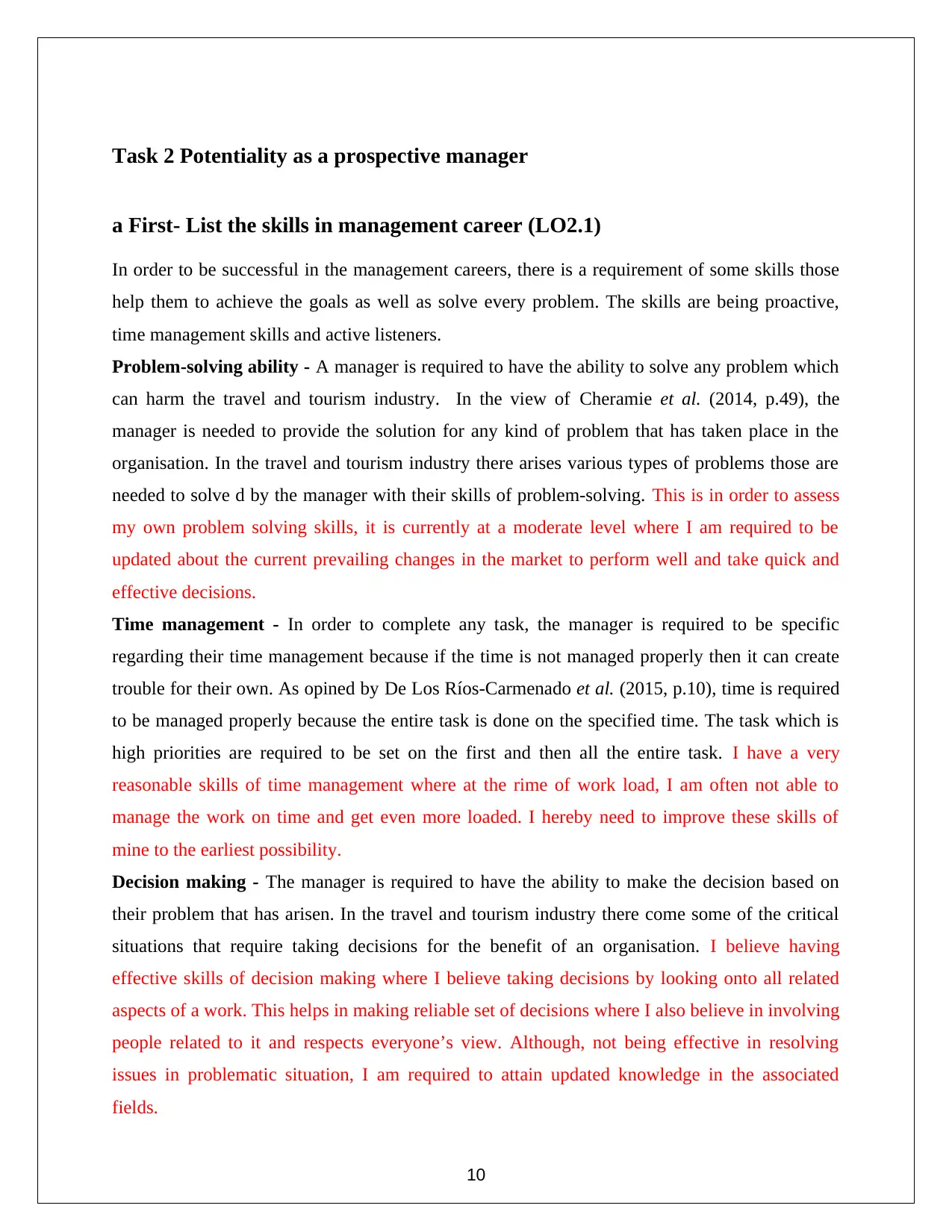
Task 2 Potentiality as a prospective manager
a First- List the skills in management career (LO2.1)
In order to be successful in the management careers, there is a requirement of some skills those
help them to achieve the goals as well as solve every problem. The skills are being proactive,
time management skills and active listeners.
Problem-solving ability - A manager is required to have the ability to solve any problem which
can harm the travel and tourism industry. In the view of Cheramie et al. (2014, p.49), the
manager is needed to provide the solution for any kind of problem that has taken place in the
organisation. In the travel and tourism industry there arises various types of problems those are
needed to solve d by the manager with their skills of problem-solving. This is in order to assess
my own problem solving skills, it is currently at a moderate level where I am required to be
updated about the current prevailing changes in the market to perform well and take quick and
effective decisions.
Time management - In order to complete any task, the manager is required to be specific
regarding their time management because if the time is not managed properly then it can create
trouble for their own. As opined by De Los Ríos-Carmenado et al. (2015, p.10), time is required
to be managed properly because the entire task is done on the specified time. The task which is
high priorities are required to be set on the first and then all the entire task. I have a very
reasonable skills of time management where at the rime of work load, I am often not able to
manage the work on time and get even more loaded. I hereby need to improve these skills of
mine to the earliest possibility.
Decision making - The manager is required to have the ability to make the decision based on
their problem that has arisen. In the travel and tourism industry there come some of the critical
situations that require taking decisions for the benefit of an organisation. I believe having
effective skills of decision making where I believe taking decisions by looking onto all related
aspects of a work. This helps in making reliable set of decisions where I also believe in involving
people related to it and respects everyone’s view. Although, not being effective in resolving
issues in problematic situation, I am required to attain updated knowledge in the associated
fields.
10
a First- List the skills in management career (LO2.1)
In order to be successful in the management careers, there is a requirement of some skills those
help them to achieve the goals as well as solve every problem. The skills are being proactive,
time management skills and active listeners.
Problem-solving ability - A manager is required to have the ability to solve any problem which
can harm the travel and tourism industry. In the view of Cheramie et al. (2014, p.49), the
manager is needed to provide the solution for any kind of problem that has taken place in the
organisation. In the travel and tourism industry there arises various types of problems those are
needed to solve d by the manager with their skills of problem-solving. This is in order to assess
my own problem solving skills, it is currently at a moderate level where I am required to be
updated about the current prevailing changes in the market to perform well and take quick and
effective decisions.
Time management - In order to complete any task, the manager is required to be specific
regarding their time management because if the time is not managed properly then it can create
trouble for their own. As opined by De Los Ríos-Carmenado et al. (2015, p.10), time is required
to be managed properly because the entire task is done on the specified time. The task which is
high priorities are required to be set on the first and then all the entire task. I have a very
reasonable skills of time management where at the rime of work load, I am often not able to
manage the work on time and get even more loaded. I hereby need to improve these skills of
mine to the earliest possibility.
Decision making - The manager is required to have the ability to make the decision based on
their problem that has arisen. In the travel and tourism industry there come some of the critical
situations that require taking decisions for the benefit of an organisation. I believe having
effective skills of decision making where I believe taking decisions by looking onto all related
aspects of a work. This helps in making reliable set of decisions where I also believe in involving
people related to it and respects everyone’s view. Although, not being effective in resolving
issues in problematic situation, I am required to attain updated knowledge in the associated
fields.
10
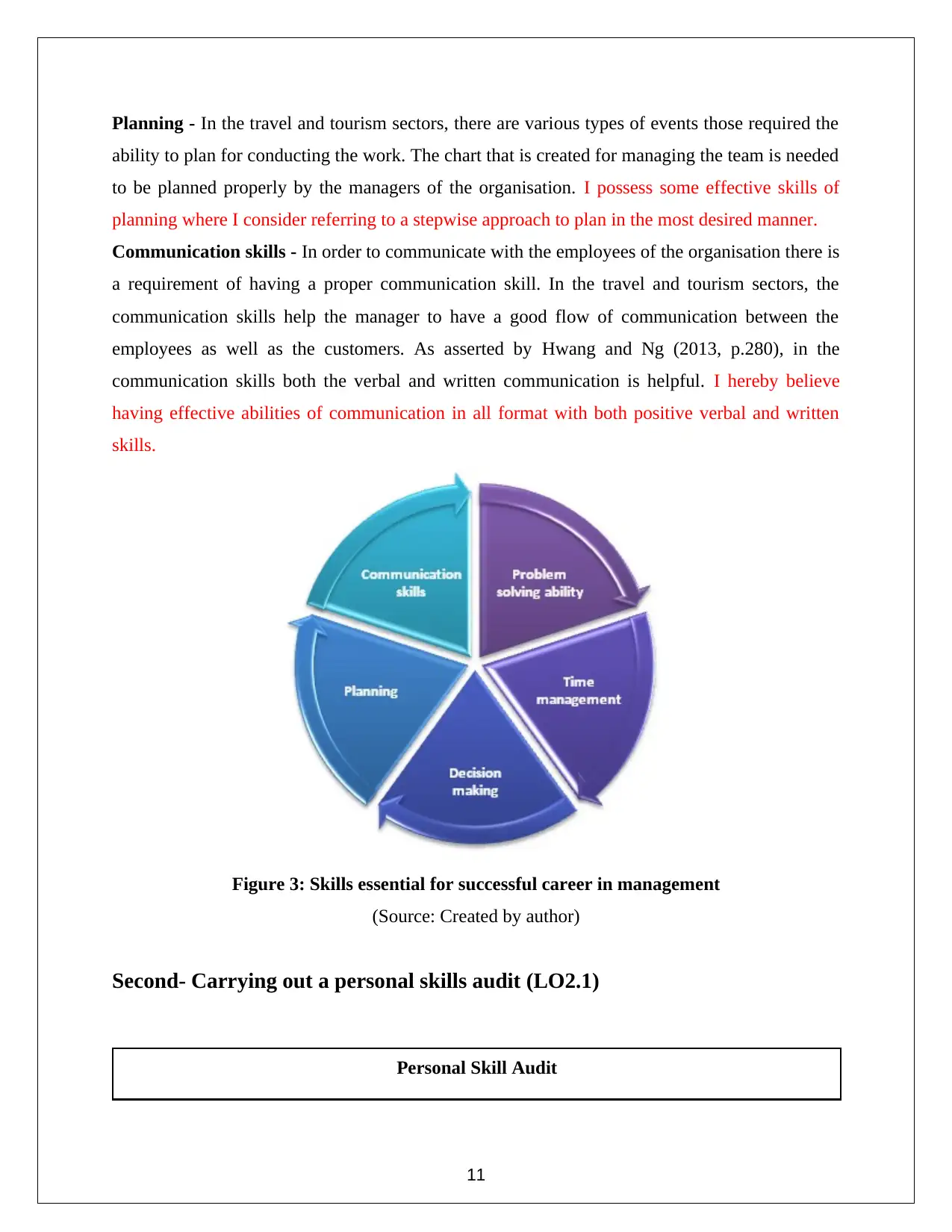
Planning - In the travel and tourism sectors, there are various types of events those required the
ability to plan for conducting the work. The chart that is created for managing the team is needed
to be planned properly by the managers of the organisation. I possess some effective skills of
planning where I consider referring to a stepwise approach to plan in the most desired manner.
Communication skills - In order to communicate with the employees of the organisation there is
a requirement of having a proper communication skill. In the travel and tourism sectors, the
communication skills help the manager to have a good flow of communication between the
employees as well as the customers. As asserted by Hwang and Ng (2013, p.280), in the
communication skills both the verbal and written communication is helpful. I hereby believe
having effective abilities of communication in all format with both positive verbal and written
skills.
Figure 3: Skills essential for successful career in management
(Source: Created by author)
Second- Carrying out a personal skills audit (LO2.1)
Personal Skill Audit
11
ability to plan for conducting the work. The chart that is created for managing the team is needed
to be planned properly by the managers of the organisation. I possess some effective skills of
planning where I consider referring to a stepwise approach to plan in the most desired manner.
Communication skills - In order to communicate with the employees of the organisation there is
a requirement of having a proper communication skill. In the travel and tourism sectors, the
communication skills help the manager to have a good flow of communication between the
employees as well as the customers. As asserted by Hwang and Ng (2013, p.280), in the
communication skills both the verbal and written communication is helpful. I hereby believe
having effective abilities of communication in all format with both positive verbal and written
skills.
Figure 3: Skills essential for successful career in management
(Source: Created by author)
Second- Carrying out a personal skills audit (LO2.1)
Personal Skill Audit
11
⊘ This is a preview!⊘
Do you want full access?
Subscribe today to unlock all pages.

Trusted by 1+ million students worldwide
1 out of 28
Your All-in-One AI-Powered Toolkit for Academic Success.
+13062052269
info@desklib.com
Available 24*7 on WhatsApp / Email
![[object Object]](/_next/static/media/star-bottom.7253800d.svg)
Unlock your academic potential
Copyright © 2020–2026 A2Z Services. All Rights Reserved. Developed and managed by ZUCOL.


